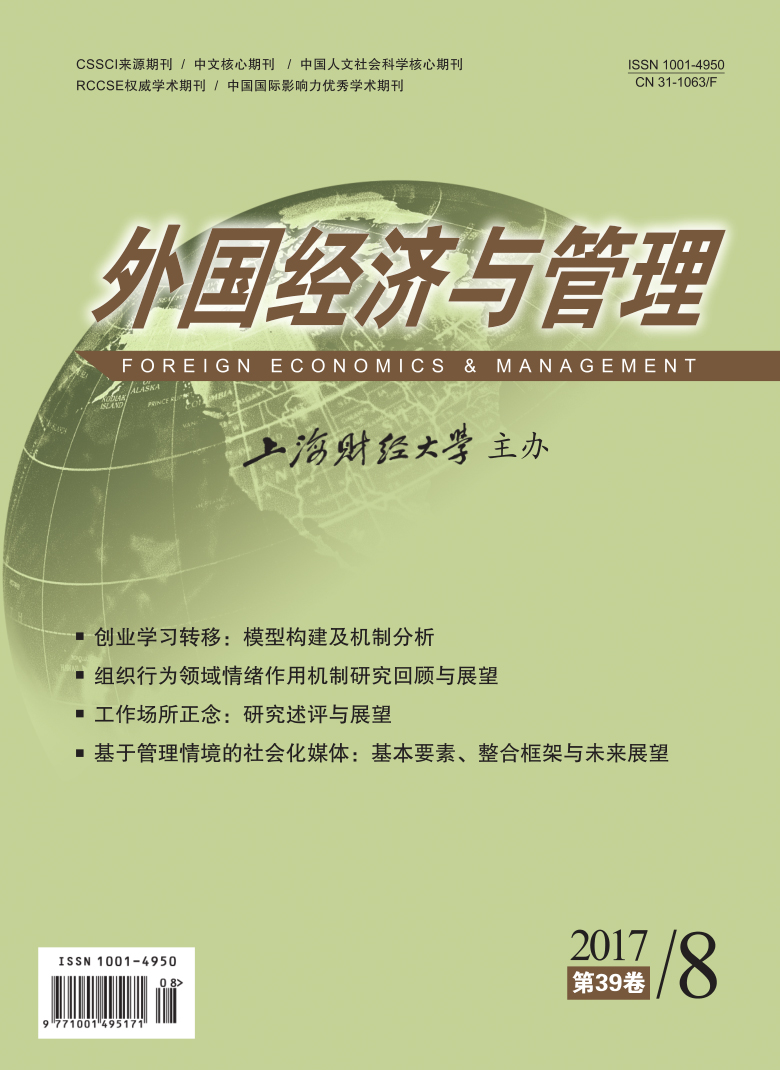创业学习已有研究成果多关注创业者学习,且质性研究居多,对员工、群体和组织等其他学习主体的创业学习机制以及不同主体之间的学习转移机制缺少关注。为弥补这一研究不足,本文从创业学习转移这一全新视角和崭新话题推进创业学习理论研究。本文构建了创业学习概念体系的5W1H模型,从何时学习,为什么学习,由谁学习,从哪学习,学习什么,以及如何学习六个方面系统完善创业学习的概念体系;构建了创业学习转移的理论模型;分析了创业者、员工、群体和组织等不同层面学习主体的创业学习机制;构建了创业者到员工的创业学习转移,员工到群体的创业学习转移,以及群体到组织的创业学习转移的理论模型,揭示了不同层面创业学习主体之间创业学习转移的路径与机制。
创业学习转移:模型构建及机制分析
摘要
参考文献
2 蔡莉, 汤淑琴, 马艳丽, 等. 创业学习、创业能力与新企业绩效的关系研究[J]. 科学学研究, 2014, (8): 1189–1197.
3 陈彪, 蔡莉, 陈琛, 等. 新企业创业学习方式研究——基于中国高技术企业的多案例分析[J]. 科学学研究, 2014, (3): 392–399.
4 单标安, 蔡莉, 鲁喜凤, 等. 创业学习的内涵、维度及其测量[J]. 科学学研究, 2014, (12): 1867–1875. DOI:10.3969/j.issn.1003-2053.2014.12.013
7 朱秀梅, 方琦, 鲍明旭. 基于领导-成员交换调节作用的目标导向对员工创业学习的影响研究[J]. 管理学报, 2016, (12): 1792–1800. DOI:10.3969/j.issn.1672-884x.2016.12.007
8 Aerts G, Dooms M, Haezendonck E. Knowledge transfers and project-based learning in large scale infrastructure development projects: An exploratory and comparative ex-post analysis[J]. International Journal of Project Management, 2017, 35(3): 224–240. DOI:10.1016/j.ijproman.2016.10.010
9 Batt R, Valcour P M. Human resources practices as predictors of work-family outcomes and employee turnover[J]. Industrial Relations, 2003, 42(2): 189–220.
10 Behling O, Eckel N L. Making sense out of intuition[J]. The Executive, 1991, 5(1): 46–54. DOI:10.5465/AME.1991.4274718
11 Bontis N, Crossan M M, Hulland J. Managing an organizational learning system by aligning stocks and flows[J]. Journal of Management Studies, 2002, 39(4): 437–469. DOI:10.1111/1467-6486.t01-1-00299
12 Capello R. Spatial transfer of knowledge in high technology milieux: Learning versus collective learning processes[J]. Regional Studies, 1999, 33(4): 353–365. DOI:10.1080/00343409950081211
13 Chen S J, Lawler J J, Bae J. Convergence in human resource systems: A comparison of locally owned and MNC subsidiaries in Taiwan[J]. Human Resource Management, 2005, 44(3): 237–256. DOI:10.1002/(ISSN)1099-050X
14 Crossan M M, Lane H W, White R E. An organizational learning framework: From intuition to institution[J]. Academy of Management Review, 1999, 24(3): 522–537.
15 Dansereau F Jr, Graen G, Haga W J. A vertical dyad linkage approach to leadership within formal organizations: A longitudinal investigation of the role making process[J]. Organizational Behavior and Human Performance, 1975, 13(1): 46–78. DOI:10.1016/0030-5073(75)90005-7
16 Easterby-Smith M, Crossan M, Nicolini D. Organizational learning: Debates past, present and future[J]. Journal of Management Studies, 2000, 37(6): 783–796. DOI:10.1111/1467-6486.00203
17 Fan D, Cui L, Li Y, et al. Localized learning by emerging multinational enterprises in developed host countries: A fuzzy-set analysis of Chinese foreign direct investment in Australia[J]. International Business Review, 2016, 25(1): 187–203. DOI:10.1016/j.ibusrev.2014.12.005
18 Firpo S, Carvalho S, Pieri R. Using occupational structure to measure employability with an application to the Brazilian labor market[J]. The Journal of Economic Inequality, 2016, 14(1): 1–19. DOI:10.1007/s10888-015-9313-3
19 Fugate M, Kinicki A J. A dispositional approach to employability: Development of a measure and test of implications for employee reactions to organizational change[J]. Journal of Occupational and Organizational Psychology, 2008, 81(3): 503–527. DOI:10.1348/096317907X241579
20 Fugate M, Kinicki A J, Ashforth B E. Employability: A psycho-social construct, its dimensions, and applications[J]. Journal of Vocational Behavior, 2004, 65(1): 14–38. DOI:10.1016/j.jvb.2003.10.005
21 Harper D A. Towards a theory of entrepreneurial teams[J]. Journal of Business Venturing, 2008, 23(6): 613–626. DOI:10.1016/j.jbusvent.2008.01.002
22 Holcomb T R, Ireland R D, Holmes R M Jr. Architecture of entrepreneurial learning: Exploring the link among heuristics, knowledge, and action[J]. Entrepreneurship Theory and Practice, 2009, 33(1): 167–192. DOI:10.1111/etap.2009.33.issue-1
23 Jones O, Macpherson A. Inter-organizational learning and strategic renewal in SMEs: Extending the 4I framework[J]. Long Range Planning, 2006, 39(2): 155–175. DOI:10.1016/j.lrp.2005.02.012
24 Lagarda A M, Madrigal D F, Flores M T. Factors associated with learning management in Mexican micro-entrepreneurs[J]. Estudios Gerenciales, 2016, 32(141): 381–386. DOI:10.1016/j.estger.2016.10.003
25 Macpherson A, Jones O. Object-mediated learning and strategic renewal in a mature organization[J]. Management Learning, 2008, 39(2): 177–201. DOI:10.1177/1350507607087580
26 Martínez-León I M, Martínez-García J A. The influence of organizational structure on organizational learning[J]. International Journal of Manpower, 2011, 32(5-6): 537–566.
27 Minniti M, Bygrave W. A dynamic model of entrepreneurial learning[J]. Entrepreneurship: Theory and Practice, 2001, 25(3): 5–16.
28 Nag R, Gioia D A. From common to uncommon knowledge: Foundations of firm-specific use of knowledge as a resource[J]. Academy of Management Journal, 2012, 55(2): 421–457. DOI:10.5465/amj.2008.0352
29 Newbert S L. Value, rareness, competitive advantage, and performance: A conceptual-level empirical investigation of the resource-based view of the firm[J]. Strategic Management Journal, 2008, 29(7): 745–768. DOI:10.1002/(ISSN)1097-0266
30 Nonaka I. A dynamic theory of organizational knowledge creation[J]. Organization Science, 1994, 5(1): 14–37. DOI:10.1287/orsc.5.1.14
31 Rae D. Entrepreneurial learning: A conceptual framework for technology-based enterprise[J]. Technology Analysis & Strategic Management, 2006, 18(1): 39–56.
32 Rae D, Carswell M. Towards a conceptual understanding of entrepreneurial learning[J]. Journal of Small Business and Enterprise Development, 2001, 8(2): 150–158. DOI:10.1108/EUM0000000006816
33 Runhaar P, ten Brinke D, Kuijpers M, et al. Exploring the links between interdependence, team learning and a shared understanding among team members: The case of teachers facing an educational innovation[J]. Human Resource Development International, 2014, 17(1): 67–87. DOI:10.1080/13678868.2013.856207
34 Shane S, Venkataraman S. The promise of entrepreneurship as a field of research[J]. Academy of Management Review, 2000, 25(1): 217–226.
35 Sheng M L, Chien I. Rethinking organizational learning orientation on radical and incremental innovation in high-tech firms[J]. Journal of Business Research, 2016, 69(6): 2302–2308. DOI:10.1016/j.jbusres.2015.12.046
36 Shih H A, Chiang Y H, Hsu C C. High involvement work system, work-family conflict, and expatriate performance-examining Taiwanese expatriates in China[J]. The International Journal of Human Resource Management, 2010, 21(11): 2013–2030. DOI:10.1080/09585192.2010.505101
37 Valaei N, Rezaei S, Wan Ismail W K. Examining learning strategies, creativity, and innovation at SMEs using fuzzy set Qualitative Comparative Analysis and PLS path modeling[J]. Journal of Business Research, 2017, 70: 224–233. DOI:10.1016/j.jbusres.2016.08.016
38 Velean D, Shoham A, Asseraf Y. Conceptualization of MILE orientation (market innovative learning entrepreneurial) for global businesses[J]. Procedia-Social and Behavioral Sciences, 2014, 109: 837–840. DOI:10.1016/j.sbspro.2013.12.550
39 Walsh J P, Ungson G R. Organizational memory[J]. Academy of Management Review, 1991, 16(1): 57–91. DOI:10.5465/AMR.1991.4278992
40 Wang C L, Chugh H. Entrepreneurial learning: Past research and future challenges[J]. International Journal of Management Reviews, 2014, 16(1): 24–61. DOI:10.1111/ijmr.2014.16.issue-1
引用本文
朱秀梅, 吕庆文, 刘月. 创业学习转移:模型构建及机制分析[J]. 外国经济与管理, 2017, 39(8): 3–15.
导出参考文献,格式为:





 10611
10611  10515
10515

